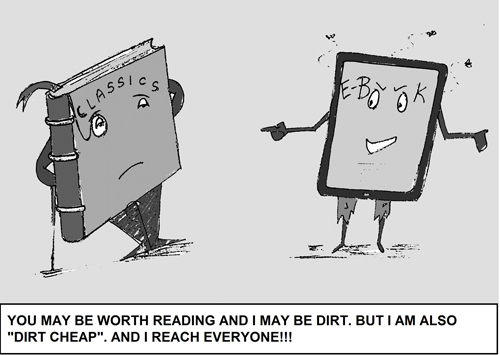
As an English major and avid reader, I have read my fair share of books. Even after reading my textbooks for school, there is something comforting about curling up with a good book. Reading can be a wonderful hobby, especially once you find a brilliant author who continues to spoil you with hours of entertainment in a $10 paperback.
That being said, I have also read an unfortunate number of poorly written books, which nowadays seem to be popping up all over the place.
Digital books, which do not require any physical materials to create (once you have something to read them on), are changing the way people read, as well as changing the way people publish.
Each year, 2.2 million unique titles are printed around the world. That figure is a bit smaller if you only include books written in English, but that’s still a huge number of books created annually.
The rise of tablets and e-readers such as the iPad, Kindle and Nook has contributed a great deal to this increased number of books. E-books can now provide an inexpensive and easy means for writers around the world to get published, even if they aren’t any good at writing.
While it has become easier to get your book published, it has also gotten significantly more difficult to make your writing stand out in the sea of published authors. It can be frightening for any hopeful author who wants to get famous. Their writing may never be read because there are so many other books out there.
And it is a legitimate concern for any newly published writer. With the number of books that are currently in print, and the number that continue to get published every year, we are officially creating culture faster than anyone can consume it.
Even if you spent most of your life reading, it would still be impossible to read all the books that are currently on the market, and that’s not even taking into account the new books that are being published each year. It’s now possible for two avid readers to never read a single book in common.
Is this overwhelming number of books pushing readers away from reading? Or is digital reading simply giving wannabe writers false hope?
Unless you were not particularly fond of reading in the first place, it shouldn’t be possible for any number of books out there to truly discourage someone from reading. It should give you a greater incentive to read, and a chance to discover new and unique books all the time. However, with record numbers of manuscripts in the world today, the nature of literature has changed.
The chances of someone publishing a really popular and well-written book these days seems a lot slimmer when readers are forced to weed through an increasingly large number of books.
Hopeful writers might feel uneasy at the thought that getting something published no longer seems like the last step toward getting famous. It is now crucial to stand out in other ways. If someone is lucky enough to get their work published, in print or as an e-book, it doesn’t guarantee them any amount of fame or renown.
This might not seem like a good thing, but, when you think about it, writers who are truly good at what they do will get popular, even if they are competing with a large number of other authors.
While the rise of digital literature has changed the way that books are being published, it has not really changed the fundamental aspects of publication and reading. Reading is still words on a page, page after page, even if you are reading them on a screen rather than a piece of paper.
And while there may be more badly written books out there since the rise of e-books, there are still well-written books out there, as well. It is just a matter of picking up a book, reading and finding out what you enjoy.

